Top 25 Java Interview Questions for 3 Years Experience (Expert Answers)
Are you preparing for a Java interview with 3 years of experience?
This guide covers the most asked Java interview questions for 3 years experience across Core Java, Java 8, Spring Boot, Collections, and more, with clear answers and code examples.
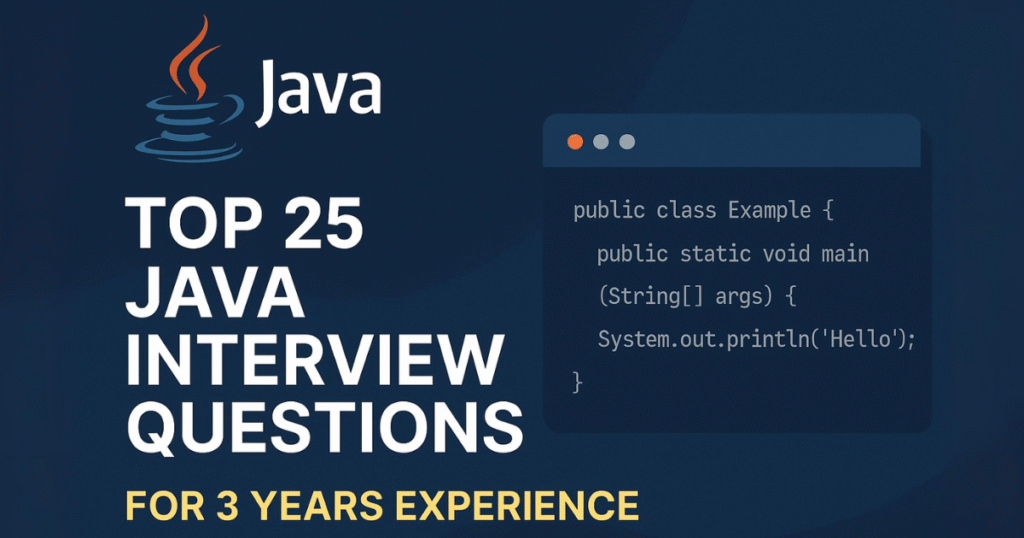
Table of Contents
🔹 Core Java & OOPs Interview Questions
1. What are the main principles of Object-Oriented Programming?
The four core principles of OOP are:
- Encapsulation
- Inheritance
- Polymorphism
- Abstraction
2. What is the difference between == and .equals() in Java?
==checks reference equality.equals()checks value equality
javaCopyEditString a = new String("Hello");
String b = new String("Hello");
System.out.println(a == b); // false
System.out.println(a.equals(b)); // true
3. Explain method overloading vs. overriding.
- Overloading: Compile-time polymorphism (same method name, different params)
- Overriding: Runtime polymorphism (subclass redefines parent method)
4. Can a constructor be final?
No. Constructors can’t be final because they are never inherited.
🔹 Java 8 & Stream API Questions
5. What is a functional interface?
An interface with exactly one abstract method.
javaCopyEdit@FunctionalInterface
interface MyFunc {
void run();
}
Used with lambda expressions.
6. What features were introduced in Java 8?
- Lambda expressions
- Stream API
- Functional interfaces
- Default & static methods in interfaces
- Optional class
- New Date & Time API
7. Stream API example to filter even numbers?
javaCopyEditList<Integer> numbers = Arrays.asList(1, 2, 3, 4);
List<Integer> evens = numbers.stream()
.filter(n -> n % 2 == 0)
.collect(Collectors.toList());
🔹 Exception Handling
8. Difference between throw and throws?
throw: Used to manually throw an exceptionthrows: Declares potential exceptions in method signature
9. Checked vs. Unchecked Exceptions?
- Checked: Checked at compile time (
IOException) - Unchecked: Runtime exceptions (
NullPointerException)
10. What is the finally Block used for?
To execute code regardless of exception, often used to close resources.
🔹 Spring Boot Questions
11. What is Spring Boot?
A framework that simplifies Spring applications:
- Embedded servers
- Auto-configuration
- Minimal setup
12. Difference between @Component, @Service, @Repository?
@Component: Generic bean@Service: Business logic@Repository: Data access layer
13. What is dependency injection?
A design pattern where the framework injects objects into classes instead of you manually instantiating them.
14. Use of application.properties?
To externalise configuration.
propertiesCopyEditserver.port=8080
spring.datasource.url=jdbc:mysql://localhost:3306/test
🔹 Java Collections
15. Difference between ArrayList and LinkedList?
| Feature | ArrayList | LinkedList |
|---|---|---|
| Access time | Fast | Slower |
| Insertion | Slower | Faster |
| Storage | Less overhead | More memory |
16. How does HashMap work internally?
- Uses hashCode and equals
- Keys go into buckets
- Collisions handled via linked list (or tree from Java 8)
17. Difference between HashMap and Hashtable?
- HashMap: Not synchronised
- Hashtable: Synchronised, slower
🔹 Multithreading
18. Difference between synchronised method and block?
- Method: Locks the entire method
- Block: Locks only a section of code or an object
19. What is the volatile keyword?
Ensures the variable is read from main memory, not the thread-local cache.
20. Difference between wait(), sleep(), join()?
wait(): Waits and releases locksleep(): Waits without releasing lockjoin(): Waits for a thread to die
🔹 Behavioural / Real-Life Questions
21. Have you used Git in projects?
Yes, for:
- Version control
- Feature branching
- Pull request-based reviews
22. How do you debug production issues?
- Log analysis
- Stack trace reading
- Tools like ELK, Splunk
23. Experience with REST APIs?
- Built using
@RestController - JSON handling
- Consumed via
RestTemplateorWebClient
24. Java Interview Questions for 3 Years Experience on Unit Testing
- JUnit 5
- Mockito
- Coverage via IntelliJ or Jacoco
25. Why should we hire you?
- 3 years Java experience
- Strong in Spring Boot, Java 8
- Clean code, REST, Git, Testing
- Proactive and team-driven
📘 More Helpful Resources
- 👉 Java Stream API Interview Questions
- 👉 Spring Boot Interview Questions
- ✅ Download our Java Interview PDF
❓ FAQs
What topics are important for 3 years Java experience?
Core Java, Java 8, Collections, Spring Boot, REST APIs, SQL.
Is 3 years of experience enough for mid-level Java roles?
Yes. You are expected to know frameworks, APIs, OOPs, and be production-ready.
How to prepare fast for a Java interview?
Practice real Q&A, revise Java 8, do mock interviews, and study system design basics.
It is always advised to read official documents for building a better understanding.
Official Java docs:
👉 https://docs.oracle.com/javase/tutorial/
Spring docs:
👉 https://spring.io/guides
📩 Got a Question?
Drop your queries in the comments or contact us here.
We’ll help you crack your next Java interview! 🚀

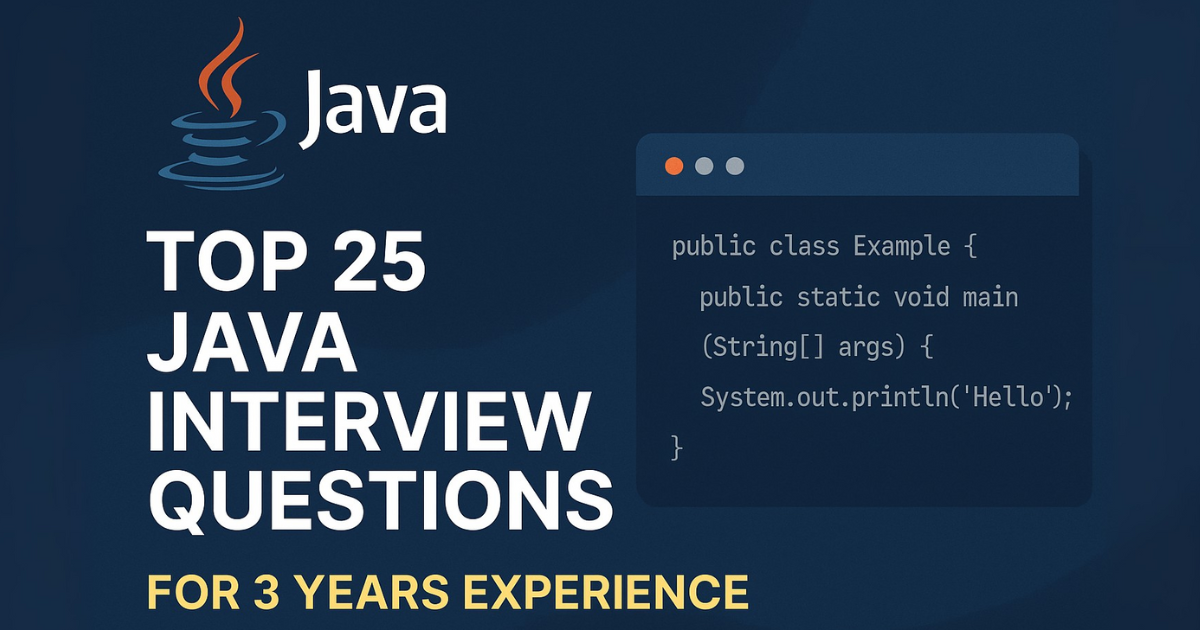
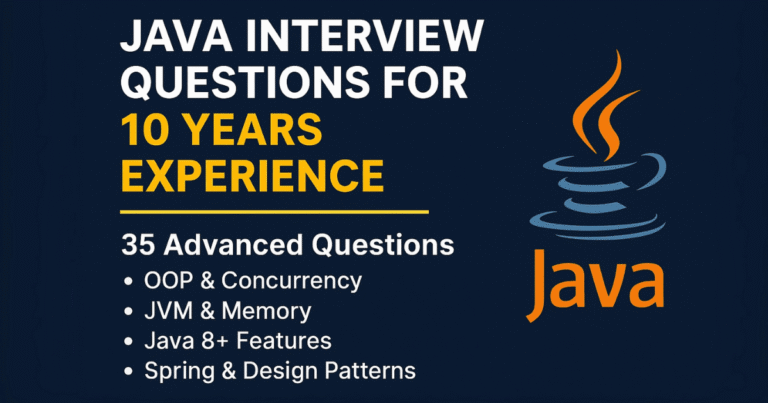
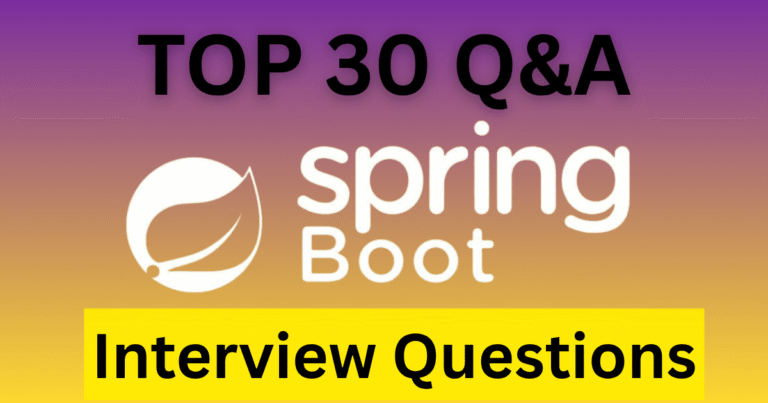
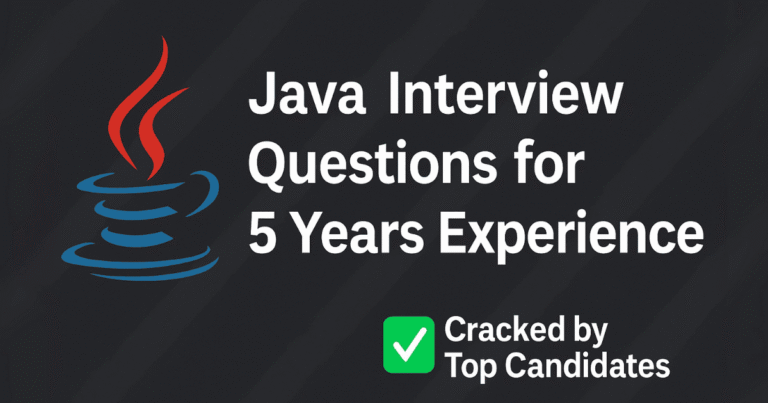
One Comment